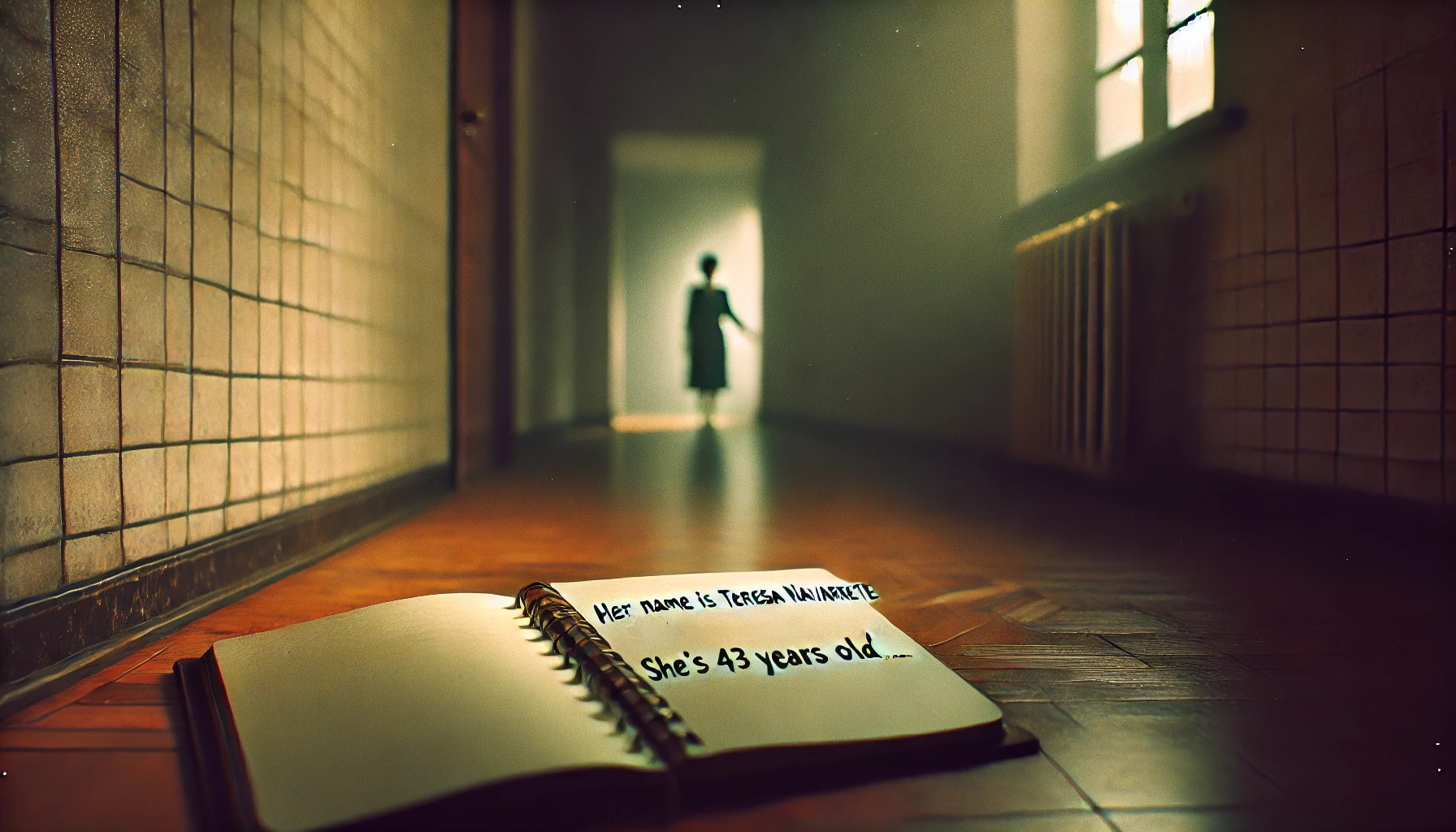What Silence No Longer Remembers
Chapter 1: The Day She Wasn’t There
Elías woke up with the unsettling feeling that something was wrong, though he couldn’t quite name it at first. The sun poured violently through the torn curtains of the window, bathing the room in a glow that felt artificial. The silence was heavier than usual. Not the kind that made Sundays kind, but one that felt like an absence. As if someone had been urgently erased.
He sat up in bed and noticed the coffee was already made. That dark, familiar scent drifted in from the kitchen, the kind that each morning confirmed his mother had woken before him. But there was no sound of the coffee strainer, no Teresa humming boleros, no clinking of the spoon against the cup. Just the smell—and the emptiness.

“Mamá,” he called out, softly.
Nothing.
He walked through the apartment with soft, almost timid steps. Teresa’s bedroom door was slightly ajar. The bed unmade. The pillow still held the shape of her head, as if she had just gotten up minutes ago. But she wasn’t there.
The table was set for two. Toasted bread, two cups of coffee, a jar of orange juice, and a small plate of butter. Everything exactly as every morning. Except she wasn’t there.
“Did you go out?” he asked aloud, more to himself than to her.
The radio was still on in the kitchen. An old bolero, scratched with static: “Everything speaks of you… even the wind in the garden…” The voice cracked, as if it too were searching for someone.
He looked at the clock: 8:14 a.m.
There was no note. No message on the phone. Just the absence. An absence carefully placed, as if it were part of the décor. An absence that didn’t interrupt anything—but contaminated everything.
He spent the first hours in limbo. He thought she’d return any minute. Maybe she went out to buy something. Maybe she was visiting Doña Ramona. But when the clock struck 11:00 and the food remained untouched, anxiety settled into his chest like an animal refusing to be tamed.
He knocked on the neighbor’s door. Doña Ramona opened it in her lavender housecoat, her face marked by interrupted sleep.
“Teresa?” she repeated, frowning. “Haven’t seen her today.”
“Not even this morning? Didn’t hear anything…?”
“No, son. Though I haven’t seen much of her lately.”
“But you spoke to her yesterday, didn’t you?”
Doña Ramona looked at him with strange slowness. Then she squinted, as if searching a distant corner of her mind.
“I don’t know, Elías. Did we talk yesterday?”
Elías swallowed hard. Something in her voice felt off, like she was avoiding a dark well inside herself.
“If you see her, will you let me know?”
“Of course, my love.”
But as she closed the door, Elías caught her whisper something softly:
“Teresa…? When was the last time I saw her?”
He returned to the apartment and opened the drawers. Her purse was still there. The keys. Her shoes. Everything. He looked through the family photos in the living room. In all of them, he appeared next to someone… but in several, Teresa’s face was barely a blur. As if out of focus. As if the camera had refused to capture her entirely.
In one photo from his tenth birthday, balloons surrounded them in blue. He smiled, teeth gapped, and beside him stood a womanly figure—but her face was indistinct, almost erased. Maybe it was the lighting, he thought. A printing error. But the next photo was the same. And the next. All of them.
That’s when the doubt began.
He didn’t eat that day. He couldn’t. He sat in front of the cold coffee cup and stared at her empty chair for hours. Sometimes he thought he heard her moving in the bedroom, but when he went to check, no one was there. At one point, he thought he heard her laugh in the bathroom. He opened the door suddenly—only to find the steamed-up mirror and a towel hanging like a body without a soul.
Elías pulled out an old notebook from the shelf. He began to write everything he remembered about her.
“Her name is Teresa Navarrete. She’s 43. She likes her coffee strong, no sugar. Always listens to boleros. Calls me ‘my sky.’ Brushes my hair when I have a fever. Taught me to read with a book of Russian tales.”
He stopped.
Was the thing about the book even true?
He wrote again:
“She worked in a bookstore… or was it as a nurse?”
He erased it.
“She took me to the beach every January. She was afraid of the sea.”
Then he remembered—they’d never left the city.
He crossed it out. Took a deep breath.
“Last year… did we celebrate her birthday? Or was she sick?”
The pencil fell from his hand. The page trembled. Not from the wind. From something else.
From doubt.
He spent the afternoon walking around the neighborhood. He asked at the corner store, the pharmacy, the park where she used to read. No one had seen her. No one remembered the last time she was there. One woman, somewhat irritated, said:
“Teresa? The one who lived with you? Does she still live there? I thought you lived alone.”
Elías left without replying. As he walked, the street felt more unfamiliar. As if it were unraveling. As if what he took for certain was beginning to erase itself with each step.
At dusk, he entered the neighborhood church. Not because he believed, but because something from childhood told him sacred places held echoes. He sat in the last pew, notebook in hand. An old priest passed by and nodded in greeting. Elías asked him:
“Do you remember my mother? Teresa Navarrete.”
The priest paused in thought. Then replied:
“The lady who came with you as a child?”
“Yes.”
“I don’t remember her face. Only her voice. But I might be confusing her with someone else. There are so many mothers alone…”
Elías thanked him and left. That night, the sky was overcast. But in his mind, a single star burned with fury: the certainty that something was slipping away—or had been stolen from him.
When he returned to the apartment, it was almost eleven. The radio was still on. A broadcaster spoke of a coming storm. Elías took off his shoes, dropped onto the sofa, and, without knowing why, began to cry. Not from sadness. But from fear.
Because he was starting to think he hadn’t lost his mother.
But that he had never had one.
Chapter 2: Where Forgetting Begins
The following night, Elías dreamed of his mother’s voice. Not her face, nor her body—just her voice, repeating his name again and again like a prayer without a god. He dreamed he was in an open field, surrounded by dead sunflowers, and his mother was calling him from somewhere beyond the visible world. He walked in circles, faster and faster, until the voice became wind, and the wind became nothing.
He woke up gasping. The radio was still on. The same song from the night before played on an endless loop. The clock read 5:12 a.m. Silence was no longer an absence—it had become a presence watching him.
In the days that followed, Elías began living like a ghost inside his own home. He moved little, spoke less, and only went out to ask about his mother, though with decreasing conviction. People looked at him strangely. Some no longer greeted him. Others simply ignored him. On some nights, he stayed awake listening to the sounds of other apartments: neighbors’ televisions, muffled arguments, an old person’s cough. And in the midst of that concert of the ordinary, his silence grew.
One Tuesday, he decided to go to the Civil Registry. He brought a blurry photo of his mother and his own ID. He waited two hours under a flickering light until a pale-faced woman with cold hands received him. He explained what he was looking for: his mother’s birth certificate, some legal trace, any proof that she existed—or had ever existed.
The woman typed lazily, searched for long minutes, and finally shook her head.
“There’s no record of any Teresa Navarrete with those details.”
“What if she changed her name?”
“No aliases registered either. Are you sure about the last name?”
“Yes,” he said—though by then, he wasn’t.
He returned home with an empty folder and a new crack in his chest. The apartment felt bigger, colder. As if absence had taken up more space. The lights flickered more than usual. The faucet water made a different noise. It was as if the house had also started to forget her.
He began speaking to the radio. In a low voice, as if his mother could hear him from somewhere deep within the static. He told her about his day, asked if she was okay, if she planned to come back. Sometimes, the radio seemed to answer: a crackle, a shift in the static, a song fragment that matched too perfectly what he had just said. Other times, it was only his own voice filling the space—becoming an echo.
One afternoon, while flipping through the notebook where he recorded memories, he found something disturbing. A page written in handwriting he didn’t recognize. It read:
“Don’t insist. Some mothers are like dreams. If you name them too much, they disappear.”
Elías slammed the notebook shut. He sat motionless for several minutes, sweat trailing down his back. Then he reopened it and searched for more strange pages. He found one more, unsigned and undated:
“Love that no one remembers is the hardest to let go.”
That night, he searched the entire apartment. He looked for traces, messages, any sign that he wasn’t losing his mind. He opened boxes, lifted rugs, checked behind the fridge. Nothing. Just dust, silence, and the echo of his own steps. In one of the boxes, he found an old doll. He didn’t remember it. Its hair was tangled, its face dirty, and it wore a faded blue dress. Tied around its neck was a ribbon that read: “For Teresa, with eternal love.” Elías shivered.
The phone didn’t ring. No one called asking about Teresa. No friends, no aunts, no old neighbors. It was as if his mother had never belonged to any circle, any world beyond that apartment. And neither had he. He tried calling a few numbers he found in a notebook, but most no longer existed. A woman answered one of them:
“Teresa? I’m sorry, no one by that name ever lived here.”
One early morning, he heard footsteps. He jumped out of bed. They were slow, dragging, like someone trying not to wake another. He stepped into the hallway. Nothing. Just the sound of wind and a faint buzz from a TV in another apartment. But on the floor, right by the front door, he found a long, black hair that wasn’t his.
Elías stepped into the bathroom and turned on the light. He stared at himself for a long time. And then a terrible thought crossed his mind: what if his mother’s voice was his own? What if it always had been? What if he invented her as a child to keep from being alone? What if all the memories were well-rehearsed lies—a necessary fiction?
He remembered something Teresa used to say—or he believed she said: “Lonely children make angels. But sometimes, angels forget they don’t exist.”
He dropped to his knees. Cried until he fell asleep on the cold floor.
The next morning, he opened the notebook with trembling hands. He no longer wrote memories. This time, he started a list of evidence. Tangible, concrete things that proved she had been there.
- Her hairbrush (with long hairs)
- The blue handkerchief she wore when cooking
- The hand cream jar (a brand he didn’t use)
- The letter he once found in her handwriting
- The lock of hair at the door
- The doll with the ribbon
But when he checked, only the brush remained. The handkerchief was gone. The cream, half-empty, had no visible brand. The letter—he couldn’t remember where he’d put it. Maybe it never existed. The doll disappeared the next night. And the hair, when he tried to keep it, crumbled in his fingers.
Elías began marking the walls with tiny pencil crosses. One for each day without Teresa. Every night before bed, he counted the crosses. They grew like mold. Soon, there was no wall without them. He lived in a cell made of memory.
One afternoon, in a burst of rage, he screamed her name with all his strength:
“TERESA!”
The scream bounced off the walls, dissolved in the ceiling, and fell dead on the carpet. The radio turned off by itself. A gust of wind entered through the closed window. And for a moment, he thought he smelled her perfume.
And in that moment, Elías knew he was no longer searching for her.
He was waiting.
Because something, deep down, told him that Teresa hadn’t left.
She had never fully dared to arrive.
Chapter 3: Where the Voices End
Elías woke with dry eyes but a soaked soul. He didn’t know how long he had slept. The radio no longer played. The kitchen clock read 3:33—a time that felt like the universe mocking him. He opened the curtains. The city was still there, silent, indifferent, repeating itself like a promise that never changes.
But something inside him had changed.
It wasn’t resignation. Nor peace. It was something else, darker and more useful: determination. If he couldn’t find his mother in the physical world, he would find her in the other. Where echoes dwell, where the residue of love lingers, where the voices no one else hears speak softly.
That morning, he left the building with a light backpack and a list of places he had never visited but somehow felt were his: the old house where he believed he’d spent a summer, the train station where he once imagined her crying, the hospital where perhaps he was born. He wasn’t looking for proof. He was looking for cracks.
He traveled for three days. Slept little. Spoke even less. At each place, he showed her picture—now blurrier than ever—and asked for her. In a small village by the sea, an old woman looked at him for a long time and said:
“That woman is not alive. But neither is she dead. Some souls remain trapped between those who love them and those who deny them.”
Elías didn’t answer. But her words pierced him like a sweet thorn.
In a crumbling hostel where he spent a cold night, he found a box of forgotten letters. One was signed by someone with his mother’s initials: T.N. He didn’t recognize the handwriting, but the last line struck him:
“If one day I disappear, don’t look for me with your eyes. Look for me with what you remember before sleep.”
He also visited a nursing home where Teresa had supposedly worked. A blind old man, touching his hands, whispered:
“You carry the same sadness in your skin that she did. As if you were born without goodbyes.”
He returned to the apartment on the fourth day. It was the same… and yet different. Upon entering, he felt that someone had just left. The air smelled of warm soup. The bathroom mirror was fogged up. And on his bed, there was a neatly folded blue handkerchief.
He didn’t scream. He didn’t cry. He just sat down and began to write.
He wrote everything. With rage, with love, with fear. Every memory, every doubt, every shadow. For days, he did nothing else. The notebook became a second body. He slept with it in his arms. He dreamed inside its pages. He redrew his childhood, his adolescence, the silences between one phrase and another. He wrote as if translating a dead language. Each word was a way to save her.
Sometimes, as he wrote, he thought he heard soft steps in the kitchen, or the floor creaking under an invisible weight. He didn’t stop. He no longer wrote to find her—but to avoid losing himself.
He began to dream of different versions of her: an old Teresa knitting in silence, another who dropped him off at a school that never existed, another who waved goodbye from a departing train. Each dream was a new farewell, and each one hurt less. As if the soul knew how to let go before the mind did.
One night, while writing a phrase he thought he remembered from her—“forgetting is also a form of love”—the radio turned on by itself. There was no electricity. No light. Just that song: “And if you’re not here, what do I have left?”
He didn’t panic. He stood, walked over to the device, and turned up the volume. Closed his eyes. And there, in the darkness, he heard her voice one last time:
“You can let me go now, Elías.”
It was a whisper—but it was enough. His hands went limp. He dropped to his knees. And for the first time, he didn’t cry. He just breathed. Deeply. Like someone resurfacing.
Since then, Elías no longer speaks of Teresa. Not because he has forgotten her, but because he finally remembers her whole. Not as a mother, nor as a ghost, but as part of himself.
He painted the walls. Erased the crosses. Left the radio off. But the notebook… he keeps the notebook under his pillow, like others keep a photograph—or a wound.
One day, at the neighborhood library, he found a book he didn’t remember ever reading. Inside, a faded dedication said: “To my sky. When you read this, I’ll be an echo inside you.” Elías closed the book with trembling hands and placed it back on the shelf without a word.
Weeks passed. Then months. Elías began teaching literature at a community center. He spoke to children about the ghosts that live in books, about how the characters we love never truly die. He never mentioned his mother, but every time he spoke of an absent character, his eyes glimmered differently.
One rainy afternoon, while closing the library, a child asked him:
“Teacher, do you have a mom?”
Elías smiled, with that expression that was half tenderness, half nostalgia, and replied:
“Yes. But she’s more air than body. More memory than voice. More truth than name.”
And the child, not fully understanding, gave him a hug. A long, silent one—as if something in him did understand after all.
Time began to pass without resistance. He learned to cook, to laugh with strangers, to remember without going mad. But every time the wind moved the curtains, Elías turned his head out of habit. Not to see if she was coming back, but to remember that she once had been.
And when someone asks him about her, he smiles faintly and says:
“My mother was a song the world didn’t want to hear. But I did.”
And that is the whole story.







